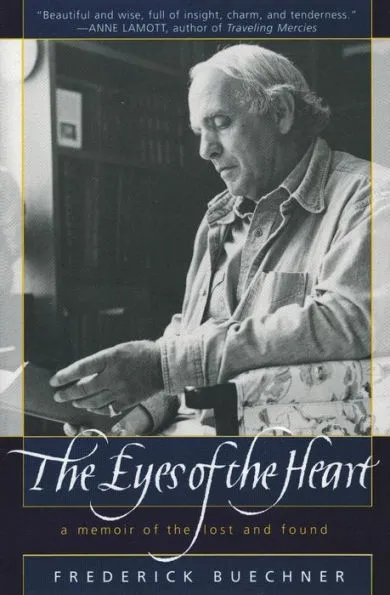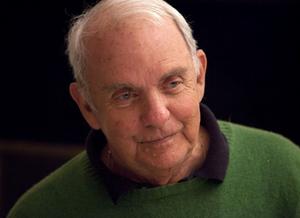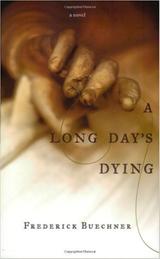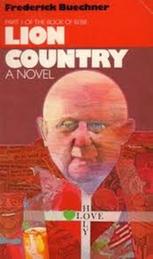 In the opening lines of one of my favorite books, The Eyes of the Heart: A Memoir of the Lost and Found (1999), author Frederick Buechner summons a ghost to his personal library: "I bring Naya into the Magic Kingdom. Naya is my grandmother, my mother's mother, who died in 1961 in her ninety-fourth year. She walks across the green library carpet and stands at the window looking out across the stream toward my wife's vegetable garden and the rising meadow behind it with a dirt track running through it up into the sugar woods on the hillside."
In the opening lines of one of my favorite books, The Eyes of the Heart: A Memoir of the Lost and Found (1999), author Frederick Buechner summons a ghost to his personal library: "I bring Naya into the Magic Kingdom. Naya is my grandmother, my mother's mother, who died in 1961 in her ninety-fourth year. She walks across the green library carpet and stands at the window looking out across the stream toward my wife's vegetable garden and the rising meadow behind it with a dirt track running through it up into the sugar woods on the hillside."
When I learned that Fred had died last Monday, I thought immediately of the Magic Kingdom, his "haven and sanctuary, the place where I do my work, the place of my dreams and of my dreaming. It consists of the small room you enter through, where the family archives are, the office, where my desk and writing paraphernalia are, and the library.... There are such wonderful books in it that I expect people to tremble with excitement, as I would, on entering it for the first time, but few of them do so because they don't know or care enough about books to have any idea what they are seeing."

|
|
| Frederick Buechner | |
Fred was 96 and I hadn't seen him for nearly 15 years, but I've been his reader for three decades. I had also, on occasion, been his bookseller. Fred was, and will remain, a subtle yet important presence in my Magic Kingdom.
He lived not far from the Northshire Bookstore in Manchester Center, Vt., where I worked as a bookseller for many years. News of his passing conjured up a memory from the early 2000s, when I was about to introduce him at an event (for Beyond Words: Daily Readings in the ABC's of Faith, I think). Just before showtime, as we sat together "backstage" at a small church next to the bookstore--where a couple hundred people were waiting for him to speak--our casual conversation became momentarily poignant when he said his writing life might be over, that the words weren't coming to him as they once had.
 My response was, I'm sure, insufficient, though he wasn't really looking for consolation, much less advice. He was considering the dilemma as if it were a curious object held to the light, an admittedly dispiriting, yet still kind of fascinating, alteration in his perception of what living meant.
My response was, I'm sure, insufficient, though he wasn't really looking for consolation, much less advice. He was considering the dilemma as if it were a curious object held to the light, an admittedly dispiriting, yet still kind of fascinating, alteration in his perception of what living meant.
Fred's New York Times obituary described him as "a Presbyterian minister who never held a church pastorate but found his calling writing a prodigious quantity of novels, memoirs and essays that explored the human condition from inspirational and often humorous religious perspectives.... Drawing on literary and theological credentials over six decades, Mr. Buechner (pronounced BEEK-ner) published 39 books." That pronunciation key is quite amusing if you'd heard as many botched attempts at his name as we fielded in the bookstore.
 The Times highlighted the success of his debut novel, A Long Day's Dying, in 1950; of his 10th novel, Godric, which was a Pulitzer Prize finalist in 1981; of Lion Country, a National Book Award finalist in 1972; and noted that he "also wrote poetry, literary reviews, essays on secular subjects and 'meditations' on religious matters."
The Times highlighted the success of his debut novel, A Long Day's Dying, in 1950; of his 10th novel, Godric, which was a Pulitzer Prize finalist in 1981; of Lion Country, a National Book Award finalist in 1972; and noted that he "also wrote poetry, literary reviews, essays on secular subjects and 'meditations' on religious matters."
In The Sacred Journey, the first of four memoirs (followed by Now and Then, Telling Secrets and The Eyes of the Heart), Buechner wrote: "More as a novelist than as a theologian, more concretely than abstractly, I determined to try to describe my own life as evocatively and candidly as I could in the hope that such glimmers of theological truth as I believed I had glimpsed in it would shine through my description more or less on their own."
At the bookstore I encountered Fred as a customer, a reader. We had brief, engaging conversations. I recall a dinner party where I had the chance to watch him interact with a small, disparate group. There was at once nothing, and everything, of the minister in his presence. He asked questions more than he made statements, but when he did offer an anecdote or opinion, you listened closely because it felt like a gift. He wore his spirituality lightly, but you always knew it was there.
Fred often wrote and talked about doubt. His response to questions regarding the church or God would not infrequently be answered with "Who knows? Who knows?" In a 2006 PBS interview, he observed: "I think the audience I try to reach are people who wouldn't be caught dead going to church. Who wouldn't touch religion with a 10-foot pole and yet deep within themselves, like everybody I think, hungers for it, hungers for some source of meaning strength and comfort. They're the ones I try to reach."
Is Fred in Heaven now? Who knows? If he's anywhere, I suspect it's in some cosmic version of his beloved Magic Kingdom, which "is magically still." In The Eyes of the Heart, which he wrote when he was about my age now, Fred "sees" his grandmother Naya standing by the window, with one finger on the glass pane, saying: "You ask me to rattle on about death. That is like my asking you to rattle on about life. Where would you begin? Where would you end? What could you compare life to when life is all you know?"

